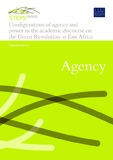Configurations of agency and power in the academic discourse on the Green Revolution in East Africa
| dc.contributor.author | Arora, Saurabh | |
| dc.coverage.spatial | Uganda | en |
| dc.coverage.spatial | Kenya | en |
| dc.coverage.spatial | Malawi | en |
| dc.date.accessioned | 2017-07-06T15:18:03Z | |
| dc.date.available | 2017-07-06T15:18:03Z | |
| dc.date.issued | 2017-07-06 | |
| dc.identifier.citation | Arora, S. (2017) Configurations of Agency and Power in the Academic Discourse on the Green Revolution in East Africa, STEPS Working Paper 97. Brighton: STEPS Centre | en |
| dc.identifier.isbn | 978-1-78118-377-9 | |
| dc.identifier.uri | https://opendocs.ids.ac.uk/opendocs/handle/20.500.12413/13072 | |
| dc.description.abstract | In this paper I perform a discourse analysis of the academic literature on the Green Revolution (GR) in East Africa, governed by two questions: what form or shape is given to agency in each GR study? And, which agencies are considered prime movers that play leading roles in the narratives and which others are relegated to subsidiary roles? A wide variety of figurations of agency are mapped, including socio-ecological events that are Malthusian or critical, heroic individuals, technology and its users, as well as relational entanglements between social, ecological and technical entities. Yet, the analysis reveals that the process of adjustment and adaptation between different social, ecological and technical entities, in practice, on farmers’ fields and beyond, is largely unarticulated in the GR discourse. Central among prime mover figurations are national governments, donors, scientists, market-based approaches and agricultural intensification technologies. I argue that such figurations help legitimate government- and donor-driven GR efforts in the last decade and a half, which are delivered largely through market mechanisms. Subsuming heterogeneous entities into unified groups such as East African smallholders, or Sub-Saharan African soils, some studies may depict their actions as homogeneous. Such homogenization masks relations of power within groups and obscures the ontological multiplicity of things. Homogenizing depictions of (inefficient) smallholders and (depleted) soils may also help steamroll the use of standardized modern technologies such as inorganic fertilizers. | en |
| dc.description.sponsorship | ESRC | en |
| dc.language.iso | en | en |
| dc.publisher | ESRC STEPS Centre | en |
| dc.relation.ispartofseries | STEPS Working Papers;97 | |
| dc.rights | Users are welcome to copy, distribute, display, translate or perform this work without written permission subject to the conditions set out in the Creative Commons licence. For any reuse or distribution, you must make clear to others the licence terms of this work. If you use the work, we ask that you reference the STEPS Centre website (www.steps-centre.org) and send a copy of the work or a link to its use online to the following address for our archive: STEPS Centre, University of Sussex, Brighton BN1 9RE, UK (steps-centre@ids.ac.uk). | en |
| dc.rights.uri | http://creativecommons.org/licenses/by-nc-nd/3.0/ | en |
| dc.subject | Agriculture | en |
| dc.subject | Aid | en |
| dc.subject | Technology | en |
| dc.title | Configurations of agency and power in the academic discourse on the Green Revolution in East Africa | en |
| dc.type | Series paper (non-IDS) | en |
| dc.rights.holder | ESRC STEPS Centre | en |
| rioxxterms.funder | Default funder | en |
| rioxxterms.identifier.project | Default project | en |
| rioxxterms.version | VoR | en |
| rioxxterms.funder.project | 9ce4e4dc-26e9-4d78-96e9-15e4dcac0642 | en |
Files in this item
This item appears in the following Collection(s)
-
ESRC STEPS Centre [225]
Except where otherwise noted, this item's license is described as Users are welcome to copy, distribute, display, translate or perform this work without written permission subject to the conditions set out in the Creative Commons licence. For any reuse or distribution, you must make clear to others the licence terms of this work. If you use the work, we ask that you reference the STEPS Centre website (www.steps-centre.org) and send a copy of the work or a link to its use online to the following address for our archive: STEPS Centre, University of Sussex, Brighton BN1 9RE, UK (steps-centre@ids.ac.uk).


